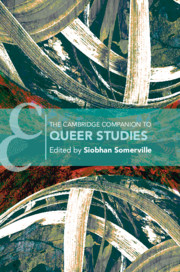Book contents
- The Cambridge Companion to Queer Studies
- The Cambridge Companion to Queer Studies
- Copyright page
- Dedication
- Contents
- Figures
- Contributors
- Acknowledgments
- Chronology
- Introduction
- Part I Genealogies
- Chapter 1 Genealogies of Queer Theory
- Chapter 2 Queer Writing, Queer Politics
- Part II Confluences
- Part III Representation
- Part IV Key Words
- Index
- Cambridge Companions to …
- References
Chapter 1 - Genealogies of Queer Theory
from Part I - Genealogies
Published online by Cambridge University Press: 02 June 2020
- The Cambridge Companion to Queer Studies
- The Cambridge Companion to Queer Studies
- Copyright page
- Dedication
- Contents
- Figures
- Contributors
- Acknowledgments
- Chronology
- Introduction
- Part I Genealogies
- Chapter 1 Genealogies of Queer Theory
- Chapter 2 Queer Writing, Queer Politics
- Part II Confluences
- Part III Representation
- Part IV Key Words
- Index
- Cambridge Companions to …
- References
Summary
This chapter offers a Foucauldian genealogy of queer theory, which does not stabilize origins, but rather probes incommensurabilities within the field, centers the element of chance that allowed certain theories to become central, and allows for the formation of new roots to the side of those canonized for “founding” a field. Assessing the influence of three major figures – Judith Butler, Eve Sedgwick, and Michel Foucault – as well as psychoanalytic theory, the first section asks what theoretical orientations each of these figures brought to the field of queer theory and how those orientations influenced later queer theorists. The chapter then turns to queer theorists who self-consciously sought alternative intellectual roots for the field and claimed new founding figures, largely in a bid to center racialized populations and/or geopolitical locations outside of Euro-North America. The ambition of this chapter is to simultaneously account for the generativity of particular theorists and theories – sometimes for critics whose political stakes and objects of study could not be more different – while leaving the field open to the claiming of new genealogies.
Keywords
- Type
- Chapter
- Information
- The Cambridge Companion to Queer Studies , pp. 17 - 29Publisher: Cambridge University PressPrint publication year: 2020
References
Further Reading
- 28
- Cited by

